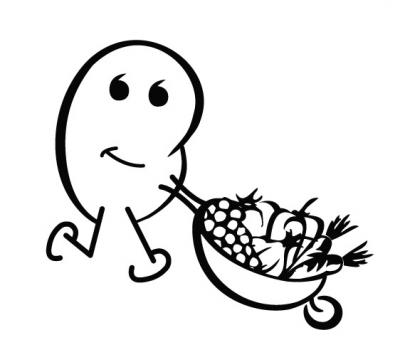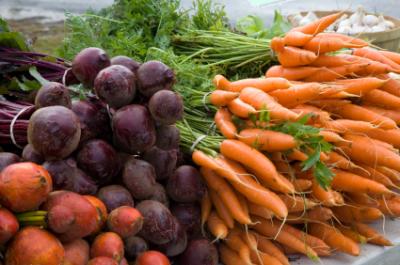 Rob M.
Rob M. | Fall Produce Storage Tips
Oct 12, 2011 at 1:36 pm |
Carrots: Carrots are hearty vegetable that will keep for an extended period of time. They will keep best if you can avoid moisture loss. Do this by storing carrots in a plastic bag, and by cutting off the greens about an inch or two above the carrots. Carrot greens will suck moisture out of the roots if they are left on. Carrots should also be stored away from fruits, which emit ethylene gas that may cause carrots to develop a bitter taste over time.
Beets: Like carrots, beet roots will keep best if the greens are separated from the bulbs. However, the greens will keep longest if kept on the bulb, which will provide the greens with moisture. It's a judgment call as to whether you will do best to remove the greens, or leave them on depending on your uses and timeframes for each. Beet greens will keep for up to a week, whereas bulbs will keep 2-3 weeks, so if in doubt you are probably better off keeping the two together. Beet greens can be used similarly to spinach or chard, and are the most nutritious part of the plant.
Arugula: Arugula is actually an herb in the mustard family. It is generally used similarly to salad greens, either as a substitute or as a complement. Arugula should be kept in a plastic bag to prevent moisture loss, and refrigerated. It will keep for just a few days. Arugula tends to be gritty, so don't forget to wash it just prior to using. If cooked, it should be added in just the last few minutes to prevent flavor loss and overwilting. Arugula makes a great pizza topping!
Baby Bok Choy: Bok choy is a very versatile green that is commonly steamed, boiled, or stir fried. Full sized bok choy stems should be removed from the leaves and discarded, but baby bok choy stems are usually tender enough for cooking. Baby bok choy stems will likely require a little longer cooking time than leaves, so it is usually a good idea to separate them and cook stems a little longer than bok choy leaves which will just need a few minutes. Boy choy should be refrigerated and will keep for 1-2 weeks.
Turnips w/ tops: Like carrots and beets, turnip greens will keep longest if attached to the roots, but the roots will keep longest if separated. Given the extended shelf life on turnip roots (3-4 weeks), it usually makes the most sense to keep the greens attached to the roots until you are ready to use them. Keep in mind turnip greens will only keep for about 1 week. Smaller turnips may not need to be peeled, but large turnips should be peeled.
Raspberries: Check for any damaged or bruised berries, and remove them from the container. Damaged fruits release ethylene gas which signals other fruits to ripen at a faster rate. This means that one bad apple really does spoil the bunch. Berries can go bad quite quickly, so make sure they are covered, and store them in the coldest part of the refrigerator. Wash lightly just before using, but not before as moisture will encourage mold growth. Raspberries will be at their juiciest at room temperature, so if possible bring them to room temperature prior to consuming.
Sweet Potatoes: Sweet potatoes should be stored at room temperature. They attain maximum sweetness 1-2 months after being pulled from the ground and stored above 45F. Sweet potatoes often keep for over 6 months, just don't forget about them!
Greens, Collards, Kale, Chard: Greens should be placed in a plastic bag, and stored in the refrigerator. If greens start to look wilted, you can revive them by snipping the base of the stems, filling a tub with ice, cold water, submerging the greens in the water, and placing the water tub in the refrigerator for 6-8 hours. The freshly snipped stems will soak up the cold water, and revitalize the greens. Grocery stores commonly use this trick before placing greens on their produce shelves.
Apples: Each variety of apple will have a different storage life, some will stay crisp longer than others. Apples will keep longest when stored in the refrigerator. To prevent moisture loss while in the refrigerator, store apples in a plastic bag. Most varieties will keep 2-3 weeks if stored in the refrigerator. Apples can also be stored at room temperature, but may only keep up to 7 days before they start to turn soft or mealy.
11 people like this! 4.71 (7 ratings) Marcey R. (Oct 17, 2011 at 12:17 pm)This was very helpful as I am always looking online to see how to store and how long they will keep. |   (Rob M.) (Rob M.) |